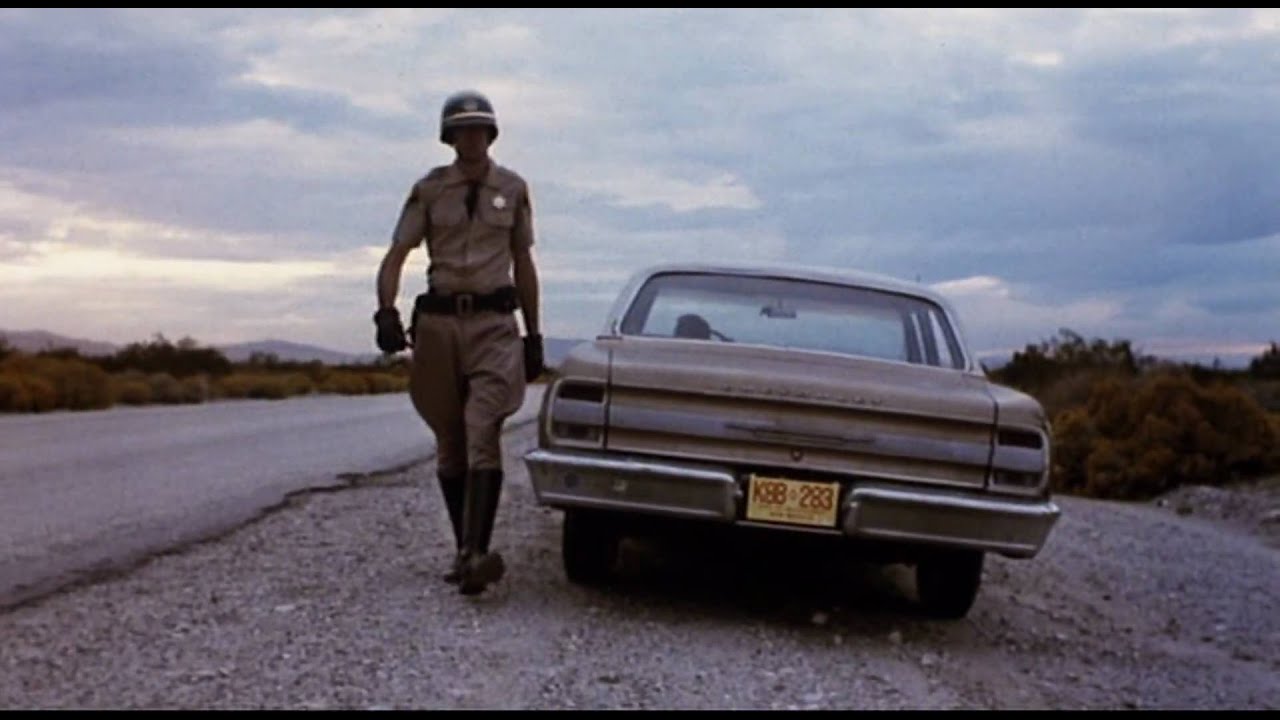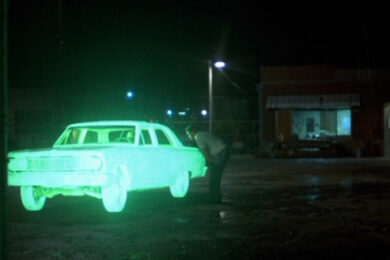Writing and making films is an accumulative process. While some directors gain instant notoriety for a particular film or genre, others take time percolating their identities as filmmakers and are usually celebrated not for a particular work, but the collection of work spanning their career.
Alex Cox is one of these filmmakers. Known for his punk rock brand of movies such as Straight To Hell, Sid & Nancy and Walker, let us not forget he was also responsible for one of the top cult films of all time, featuring one of the greatest punk rock soundtracks: Repo Man.
Taking place amid an estranged world, numb with fear of nuclear annihilation, Repo Man is a beautifully apocalyptic fairy tale of rebellion, desperation and escape during a time when we thought we were going to blow it all up or, at least, snort it all up. In an era of New Wave fashion and music consumed via MTV, the movie boasted a punk-driven soundtrack (Black Flag, The Circle Jerks, Fear, Iggy Pop) which counteracted the pop aesthetic of the 1980s, delivering an unsettling and doomed vision of the youth and their future.
Repo Man is released on Blu-ray in the UK this week. However, thanks to the great bureaucracy of the American film establishment – Universal Studios to be exact – the idea of a US release hasn’t even batted a lash. According to Alex Cox, "It’s an institutional animus" – an institutionalized corporation of drones fearful of losing their jobs.
We got to speak with the director in detail about the re-release and cultural essence of Repo Man, the social stigma of the 1980s, Hollywood being run into the ground by Satanists, and why you should immediately pirate all his work after you read the following interview.
Where did the story of Repo Man come from?
Alex Cox: I had a neighbour who was an actor and his roommate was a car reposesser, so I was interested. The guy was telling me about his job and I thought, ‘there’s a film in this’. I became somewhat like an apprentice to this repo man and drove around in the car with him at night. If we got lucky and found somebody’s car, then I’d get to drive it back home or drive it back to the yard – or drive the man’s car while he drove the repo vehicle – and I would get paid $20.
It’s like the scene where Otto, played by Emilio Estevez, first heads out with Bud the repo man. He’s ecstatic. Was that based on your excitement?
AC: Well, I was a bit more cynical than that. I just thought it was interesting because it was legalized theft. These guys were going on private property, they were trespassing, and they were masquerading as policemen and taking people’s stuff just because of a criminal enterprise called General Motors Acceptance Corporation gave them permission to. So, you know it was a pretty morally complex situation. I don’t think the character Otto was entirely aware of the complexity of the situation.
In retrospect, underneath its eccentric properties and its fantasy/sci-fi appeal, is Repo Man a social commentary on the Cold War ’80s?
AC: At the time it did seem [like that], with a combination of Mrs Thatcher in England and the sighting of Cruise and Pershing missiles in the UK and Jimmy Carter’s plan for the MX missile in the US, which was enthusiastically endorsed by Reagan. It did seem we were all going to get killed. It was kind of alarming, you know?
We had MTV to distract us during the upper end of the Cold War.
AC: Right. And, there were films like The Breakfast Club and stuff that you could watch which had no content whatsoever but would be thoroughly entertaining. I wanted to make a film about nuclear war or something like Dr Strangelove or Peter Watkins’ The War Game, but the prevailing wisdom at that time of most producers and of the studios was that the film had to be pitched to a mental age of 15 and had to star a teenage boy. So… that’s what we did. (laughs)
Bud, played by Harry Dean Stanton, was originally written for Lee Ving, frontman of the band Fear.
AC: We were going to do it super low budget with all four members of Fear, but it never came about. We tried to raise $100,000 to make the film on the low road and couldn’t raise the money. Then, Michael Nesmith, Executive Producer comes along and says he can take it to the studio and get more money. Then we had to cast people who were names. Dennis Hopper was better known than Harry at that time, so we went after him. He was very nice but wanted a little more money than we could afford, so we were able to get Harry and he was perfect.
One of his finest performances along with Paris, Texas.
AC: Those are the only two films he’s ever had a lead in, I think. The main guy in Repo Man and then right after that, he and [cinematographer] Robby Müller joined Wim Wenders and they went off to do Paris, Texas. I don’t know if Harry had another lead since then.
In the making of the television version of Repo Man, I heard there were Satanists getting involved in the editing process to some degree.
AC: Universal didn’t like the film at all but when it was very successful in the cinema and on video, they wanted to have a broadcast TV version which had to be cleaned up – no swearing or drug use. I helped them create this new version. But they’d gone in to fool around with the film for the video version and they shot new footage, and what they shot was the license plate of the New Mexico car that Fox Harris was driving. Then they kind of dissolved in and you saw the face of the devil on it. It kind of offended film language. To have the devil’s face appear? What was that about? Are they Satanists?
Did they confess to it?
AC: (laughs) No. I’ve never gotten anyone at Universal Studios to confess that they were Satanists. I’m still waiting for the confession.
After its release, you ended up filming in Nicaragua?
AC: Not that soon after. Repo Man made a lot of money in Britain for an independent distributer. After that I was able to get another film in Britain, which was Sid & Nancy, and after that I did Straight To Hell. So it was 1987 when we went to Nicaragua and did Walker.
Joe Strummer composed one hell of a soundtrack for Walker. What was your relationship with him like?
AC: If you’re working with someone creatively, you’re likely to be friends with them. That’s the best thing about making films, the group – the unity of the group and everyone working together. I think Joe was looking for something like that because at that time, having broken up The Clash and getting a lot of trouble for that, he was looking for another direction. I mean, to write film music and be an actor, why not? I think as an actor, in Straight To Hell, he’s very, very good. He’s kind of been overlooked a little bit in that film.
Do you think Repo Man helped paved the way for films where you have eccentric characters, witty dialogue with pop culture references and an emphasis on soundtrack?
AC: I think Straight To Hell was more of an influence, actually. I think the character that Sy Richardson plays reappears in a lot of subsequent films. Sometimes he’s played by Samuel L. Jackson or sometimes he’s, you know, that character.
Didn’t you give up in trying making a sequel to Repo Man? Have you abandoned any projects?
AC: Give up? Never. Listen, to go looking for money on a film is not the same as not completing the film. A film director that abandons his film and fails to complete it is an asshole. If you have backing for a film and you spent a bunch of other people’s money and fail to finish it? That’s pretty irresponsible. You have to do it. You’ve got to finish it, man. We took Repo Man sequels to Universal and proposed they do it, but they weren’t interested. What they did instead is they brought out a movie titled Repo Men and pretended that was the sequel.
In Wayne Ewing’s documentary Breakfast With Hunter, you appear in the late writer Hunter S. Thompson’s kitchen as producer and writer of the film Fear And Loathing In Las Vegas. Hunter berated you over conflicting views of how the film should be made. He hated your idea to add animation to the film and fired you. Why?
AC: We were hired to write and direct the film. I was obviously familiar with his literary work. He’d forgotten about the Steadman cartoons. That was the really sad thing. He was thinking Doonesbury.
You were trying to make that point but I don’t think he was hearing it.
AC: The sad thing is that he really should have gotten off of drugs and alcohol. They destroyed him. He just seemed to fall down with his writing after the great years of Fear And Loathing An The Campaign Trail, …Vegas and then The Curse Of Lono. He had a problem with drugs and alcohol. The people who surrounded him didn’t help him, didn’t encourage him to get treatment. They called for him and enabled him to do crazy things like a circus geek. Dennis Hopper said at a certain point, ‘Ah man. I got to get off the cocaine and alcohol’, and he did.
Drugs and alcohol have always validated some creative purpose or legend for artists, it appears.
AC: It’s such a bullshit legend. I was talking with an old film director about a conversation he had with his wife. If you could be a writer, who would it be? He says, ‘Papa Hemingway’. Hemingway blew his head off with a shotgun! Why would you want to be like that? We romanticize guys who need help. It’s glorified and romanticized suicide
Hence the theme of Repo Man, and how it glorified the desperate and awful 1980s.
AC: Yes and there’s this weird thing about Tracey Walter’s character, Miller. He doesn’t have anything. He lives in garbage. And yet, he alone, a mystic, can fly the UFO time machine. The character Miller got more and more important as we shot the film. [Originally] the film ended differently: we open the trunk of the car, there’s an atom bomb and – boom – it goes off and destroys LA. We all got to kind of love Los Angeles and to love the characters, so to kill them all off was, you know…
Repo Man is coming out on Blu-ray but not here in the United States. Why?
AC: Universal Studios has an antipathy towards Repo Man and towards Walker. I don’t think they will ever bring out a good version in the US. I can’t understand why Universal won’t do a sequel given how much money they made off the original Repo Man. It’s an institutional animus. The kinds of people that get jobs in studios tend to be fearful of their superiors and that’s how they keep their jobs. The guys at Universal, even though they were 13 when Repo Man came out, they’ve been told by their superiors: ‘We don’t like that film’. And that’s the official attitude from generation to generation in the studio. They have an institutional animus which almost makes you think that corporations really could be people
Then there’s the crisis of getting rights from studios.
AC: It’s so corrupt. Now they want to have longer copyright periods because they say the young artists are relying on this money. The young artists never see any money because they sign away that money to big media corporations, like Universal and Viacom. We, the artists, lose all of our rights to these massive corporations, who then come down heavy on these kids for downloading films and music that we never see a penny from. It’s complete bullshit. I want to encourage your audience to go and pirate a bunch of my stuff right away.
Repo Man is out now on Blu-ray through Masters of Cinema/Eureka Entertainment. The film will be also be presented at the ICA next Wednesday February 29 by Midnight Movies, with a pre-screening fancy dress party. More information about the latter event here.





